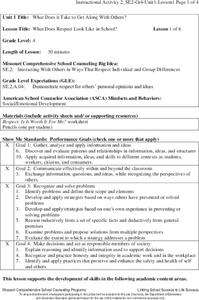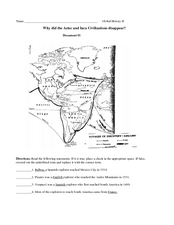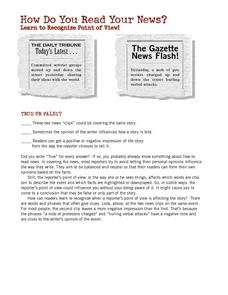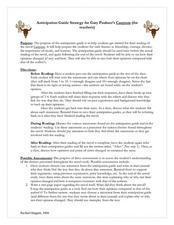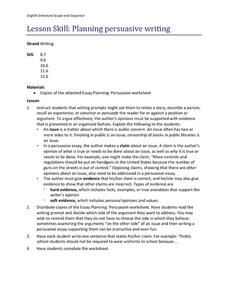Smithsonian Institution
Mary Henry: Journal/Diary Writing
A great way to connect social studies with language arts, a resource on Mary Henry's historical diary reinforces the concepts of primary and secondary sources. It comes with an easy-to-understand lesson plan, as well as the reference...
Museum of Tolerance
The Pursuit of Democracy and Diversity: The Trial of Pro-Social Injustice in Historical Documents and Accounts
Class members investigate The Indian Removal Act of 1830, U.S. Theft of Mexican Territory Timeline, and President Abraham Lincoln’s letter to Horace Greeley, 1862, and then conduct a mock trial of each of these documents to determine...
Education Development Center
Sum of Rational and Irrational is Irrational
Sometimes the indirect path is best. Scholars determine whether the sum of a rational number and an irrational number is irrational. Reading a transcript of a conversation between classmates leads to an indirect proof of this concept.
Library of Virginia
Life as a Liberated People
Imagine having no control over your life and then suddenly having to provide for yourself. Such was the challenge faced by many American slaves after emancipation. Class members are asked to consider these challenges are they examine...
Library of Virginia
Antebellum Freedom
From indentured servitude to involuntary race-based servitude, slavery has taken many forms in American history. Class members examine three manumission petitions that reveal how the rights of African Americans and African American...
National History Day
Why Did the United States Enter World War I in 1917?
World War I was the first major conflict on a global scale. Using primary documents, learners determine why the United States chose to enter World War I when it did. After analytical writing and group research, the causes of America's...
Ogden Museum of Art Education Department
Literacy and Landscapes
As the saying goes, art often imitates life ... and literature! A series of activities designed to accompany a visit to the Ogden Museum of Southern Art encourage writers to find inspiration in various landscapes. The lesson includes a...
BrainPOP
World History Lesson Plan: Uncovering Essential Questions
Have you ever noticed a news story revolves around an essential question? Scholars research methods of reporting historical events. Working in groups, they use an interactive module to gather information on a historical topic, uncovering...
Saylor Academy
Persuasive Techniques
Want to safeguard your students against peer pressure? Teach them all about rhetorical appeals, common attack methods, and various argument tones with a reference sheet on persuasive techniques.
State Bar of Texas
Hernandez v. Texas
What if the jury is not made up of people from your ethnicity or background—are they still considered your peers? Scholars analyze the impact the Supreme Court case Hernandez v. Texas had on jury selection across the nation. Paired...
State Bar of Texas
White v. Regester
One vote doesn't really matter, right? Class members investigate the concept of voter rights and restrictions using the 1973 Supreme Court case White v. Regester. They view a short video and work in pairs to analyze how people create...
State Bar of Texas
Texas v. Johnson
If you saw a person burning an American flag, how would you feel? Scholars analyze the concept of freedom of expression and speech with the Supreme Court case Texas v. Johnson. A short video clip creates open discussion in pairs on the...
Missouri Department of Elementary
What Does Respect Look Like in School?
What does it mean to be respectful? Scholars complete a self-assessment worksheet to determine just how respectful they are. Next, they choose three items from the survey and write plans for how to improve in those areas.
Missouri Department of Elementary
What Does Respect Look Like at Home?
Individuals consider why is it important to respect family members as they complete a self-respect survey to assess their respectful behaviors at home. They then choose three items from the survey and write about how they plan to improve...
Curated OER
Threats to Validity
Students review the components of the scientific habits of mind. In groups, they use this information and relate it to scientific investigations. They develop strategies to evaluate information and evidence and how to question sources...
Curated OER
Listen and Do Art
Students listen to directions and complete an art project. They distinguish among kinds of information and purposes and complete multi-step tasks. The teacher gives directions while the student learns, and subsequently the student has to...
Curated OER
Tracking down Good Information on the Web
Fifth graders brainstorm on whiteboard Web authorship and what they think they need to know about information on a website in order to judge its content. They research the solar system websites and present them to the class with their...
Curated OER
Religious Dissent
Learners perform a readers theater about Anne Hutchinson and her religious dissent. In this religious dissent lesson plan, students re-enact her trial through the reader's theater.
Curated OER
Why did the Aztec and Inca civilizations disappear?
Middle schoolers can analyze primary source documents to answer the question, "Why did the Aztec and Inca civilizations disappear?" They will read the provided excerpts then answer 11 different questions to uncover the ultimate answer.
TV411
How Do You Read Your News?
Words carry baggage. Class members are asked to consider the weight of words in an exercise that contrasts the word choices in two versions of the same event. Consider following the exercise with an activity in which pairs craft positive...
Curated OER
Mock Appellate Arguments
Students participate in a mock appellate argument by role playing a case. They develop a case and present it to the judge using proper argument techniques.
Curated OER
Anticipation Guide Strategy for Gary Paulsen's Canyons (For Teachers)
"Things never change." "It's okay to steal from those who already have a lot." Before reading Canyons, readers respond to an anticipation guide that focuses on issues raised in Gary Paulsen's novel. Groups share their responses, and...
Virginina Department of Education
Planning Persuasive Writing
A nice starting exercise that organizes a learner’s persuasive writing assignment by issue, claim, and hard and soft evidence. Definitions of the terms aforementioned are provided, as well as the worksheet needed by the class. The...
Curated OER
Comparing Themes Across Texts
Read various texts to compare the themes across each text. Learners write a journal entry describing the most beautiful scenery they've seen and use a map of the United States to locate the Sequoia National Park and Muir Woods. They then...
Other popular searches
- Fact Opinion Lesson Plans
- Fact and Opinion Passages
- Fact Opinion Worksheet
- Fact and Opinion Lessons
- Teaching Fact vs. Opinion
- Fact and Opinion Worksheets
- Teaching Fact and Opinion
- Fact and Opinion Games
- Reading Fact and Opinion
- Fact and Opinion Keywords
- Identifying Fact or Opinion
- Fact Opinion Quiz














